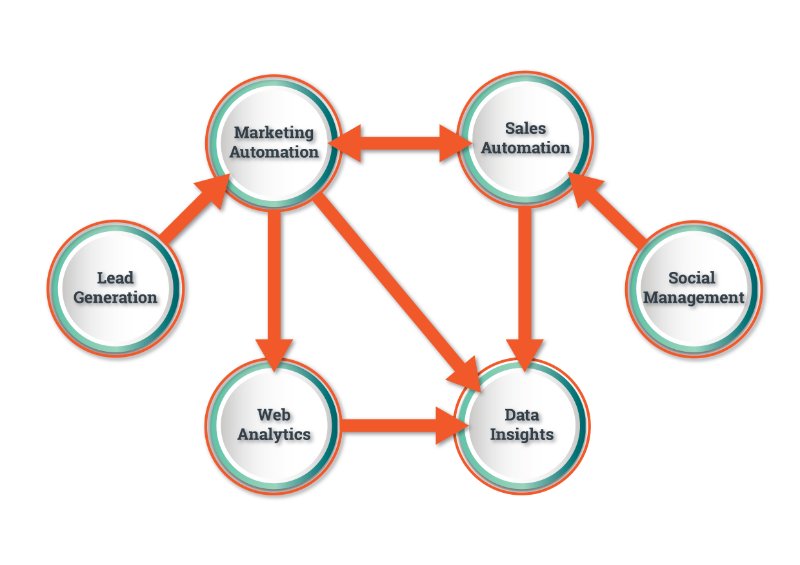With thousands of marketing technology solutions out there, approximately 3,500 according to marketing technologist Scott Brinker, how can you ensure your company is using them effectively? Are you not seeing the desired ROI from marketing efforts or struggling to integrate sales and marketing operations? By hiring an in-house marketing technologist, you can perfectly integrate and manage your marketing technology (MarTech) stack to leverage its power and data. You’ll also be able to segment leads, personalize customer interaction, clean up your data and gain unique insights through automation of these technologies.

Example of a MarTech stack for an SMB
With the explosion of new marketing technologies and digitization of marketing operations, there’s a growing need to ensure a company’s stack is aligned with its business objectives. However, only 16 percent of marketers report their marketing technology strategy is tightly aligned to business strategy. As with many SMBs, there are likely several vendors and agencies used to operate different marketing operations such as website analytics, PPC advertising, SEO and content creation. All these technologies should be able to provide your team with insights on which channels have the highest ROI and contribute most to revenue. The solution? An integrated marketing stack or MarTech stack.
What is the integrated MarTech stack?
It’s a set of tools that your business uses to manage your marketing data. The stack tracks your ROI and gives you the insight to make decisions on where to focus resources and measure which marketing efforts are most effective. Since marketing and technology have become deeply intertwined, it’s now time for marketing to take charge of the new solutions and manage their effectiveness. The MarTech stack isn’t just for marketing, it also applies to sales to facilitate the buyer’s journey and integrate sales and marketing operations. According to leading data analyst Venkat Viswanathan, analytics from the MarTech stack provides hindsight, insight, and foresight on an organization’s revenue if each technology is aligned with the overall business strategy. Without this, it will be extremely difficult to build an engine for predictable revenue and growth will likely stall.
The impact of MarTech
A recent study shows that 42% percent of CMOs who own, understand and leverage their marketing technology strategy see greater business impact than those who do not. The report also shows that “those who integrate a technology strategy within their overall marketing strategy are able to achieve more personalized customer interactions across channels.” In addition, 59% percent of those who have integrated this strategy report achieving more targeted, efficient and relevant customer engagements. Integrating all technologies into one system and strategy equals a higher performing marketing team and a higher revenue over time.

The ideal MarTech stack for an SMB is a system that results in “increased visibility without placing any additional burden on the salespeople or the rest of the team and the data collected is accurate and automatically captured”, according to Mark Roberge from Hubspot.
Managing your MarTech
If you’re using several different vendors and third parties such as agencies to operate your MarTech solutions, how can you keep them accountable and effective in addition to staying aligned with the company’s goals? CMO Tracy Hansen of Tealium says “most CMOs are unaware of how many digital marketing solutions they are using, and a majority have not defined a coherent and comprehensive marketing technology strategy or a path forward.”
The solution to this lack of integration of MarTech is hiring an in-house marketer with technology integration skills to bring all the digital solutions together and optimize them around the business.
The in-house marketing technologist
Systems that facilitate transparency throughout the marketing process, enable you to see what marketing efforts are working and which ones are not and where ROI is coming from. This allows you to begin building predictable models for revenue. This integration is only achievable through dedicating a member of your in-house team to execute the strategy. It’s important for this person to fully “own” the MarTech and strategy since they have the best understanding of the company’s overall goals, something a third-party or agency cannot provide. As Annuitas, a lead generation firm, describes the MarTech stack, “all the pieces need to fit, and that requires an understanding of the technology strategy within the context of a larger demand strategy which is aligned and planned around the buyer’s journey.”
With an in-house technologist, you have 100% dedication to your business and you own the strategy. This technologist will also be tasked with keeping third-party vendors accountable and effective. A technologist must have a deep understanding of the reporting behind all of the technology provided by vendors and will ensure that your key performance indicators (KPI’s) are being met.
Hiring a new member to your team will cost money, of course, in the short-term. However, the cost of this new hire will be offset quickly by the increase in revenue from the increase in effectiveness of marketing by using the integrated MarTech stack. As CMO Tracy Hansen further explains, “embracing a unified marketing model generates measurable ROI and improved economics.”
Depending on the size of the company, this usually does not mean that an SMB needs to hire a new six-figure employee. Finding the right candidate with a disposition for data, systems and strategy is key. They can then be trained in a variety of digital modalities. Continuing education is also essential to the success of this position.

What does this talent look like?
This new hire needs the analytical skills to integrate your MarTech into one strategy but also have a wide breadth of marketing experience to understand each of these technologies. For example, you’ll need someone who understands AdWords and PPC enough to manage the agency running your campaigns if this is part of your business’ strategy. This marketer will have a good overall understanding of the most widely used marketing technologies in addition to project management skills necessary to bring these operations together into one strategy. They will also have strong communication and interpersonal skills necessary to support and bring together sales, operations, development, etc.
Integration of your MarTech stack could be the key to unlocking your company’s growth. The time to act is now. The efficiency and effectiveness of your marketing strategy is at stake. Get ahead of the curve by hiring the right talent and training them to succeed long-term with your business.
Note: This article originally appeared on LinkedIn and is re-published with approval from Digital Creative Institute
Want to know how your MarTech stack measures up? Schedule a consultation with Cunning Digital to evaluate your current stack’s effectiveness.
From Our Blog

Is your marketing out of control? Own your MarTech stack.
With thousands of marketing technology solutions out there, approximately 3,500 according to marketing technologist Scott Brinker, how can you ensure your company is using them effectively? Are you not seeing the desired ROI from marketing efforts or struggling to integrate sales and marketing operations? By hiring an in-house marketing technologist, you can perfectly integrate and […]

2017 Small Business Marketing Technology Stack
As you head into 2017, you may be considering investing money into your digital marketing efforts. Start by building your small business marketing technology stack. There’s an incredible amount of tools and technologies available to market your business, a marketing technology (mar-tech) stack will unify your efforts to be more effective and reach more customers. […]





